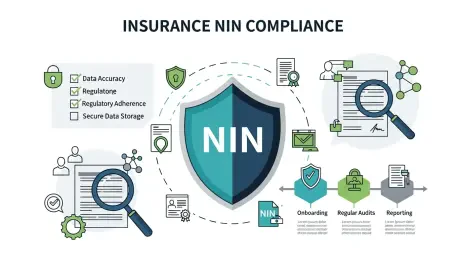In a groundbreaking move to revolutionize transparency and accountability within Nigeria’s insurance sector, the National Insurance Commission (NAICOM) has introduced a transformative policy that mandates the linkage of critical identification documents for all insurance customers. This directive, aimed at bolstering the integrity of the industry, requires individuals to link their National Identification Number (NIN) and corporate entities to submit Corporate Affairs Commission (CAC) documents by a firm deadline in April 2026. It represents a significant step toward aligning the sector with global standards of customer verification and fraud prevention. As Nigeria continues to modernize its financial systems, this policy underscores a broader commitment to ensuring that every insurance contract is backed by accurate and verifiable data, fostering trust among stakeholders and regulators alike. The implications of this mandate are far-reaching, promising to reshape how insurers and brokers operate while addressing systemic vulnerabilities.
Strengthening Regulatory Oversight
Enhancing KYC Standards in Insurance
The core of NAICOM’s directive lies in its push to strengthen Know Your Customer (KYC) protocols across the insurance landscape. Individual policyholders are now required to link their NIN to their insurance policies, a measure designed to ensure that personal data is accurate and traceable. For corporate clients, the submission of CAC documents, such as the Certificate of Incorporation and details of directors, is mandatory to establish legitimacy and ownership transparency. This initiative is not merely a procedural update but a fundamental shift toward creating a robust framework where insurers and brokers can confidently verify client identities before initiating coverage. By enforcing these requirements, NAICOM aims to mitigate risks associated with identity fraud and enhance the overall reliability of the sector. The directive also aligns with national efforts to integrate digital identification systems, ensuring that the insurance industry keeps pace with evolving regulatory expectations.
Strict Enforcement and Compliance Deadlines
Compliance with this new policy is non-negotiable, as NAICOM has explicitly prohibited insurers and brokers from issuing any coverage without the mandated documentation. Proposal forms must now include clear statements about the necessity of NIN for individuals and CAC records for corporations, ensuring that these details are collected upfront. For group life policies, a detailed schedule containing employees’ names, dates of birth, and NINs must be submitted before a policy can commence. Any submission lacking the required information will be rejected outright, leaving no room for exceptions. Additionally, for existing policies that predate this directive, insurers have until April 2026 to update records by reaching out to policyholders directly or through intermediaries. This transitional period is a strategic effort to balance the need for compliance with the practical challenges of updating vast databases, ensuring minimal disruption to ongoing coverage while enforcing accountability.
Industry Impact and Implementation Challenges
Operational Shifts for Insurers and Brokers
The introduction of NAICOM’s directive signals a significant operational shift for insurers and brokers, who must now adapt their processes to accommodate the new documentation requirements. This involves revising internal systems to capture and store NIN and CAC data securely, as well as training staff to handle these updated KYC protocols effectively. Beyond logistics, there is a pressing need to conduct extensive customer awareness campaigns to educate policyholders about the importance of submitting the required information. Insurers bear the responsibility of ensuring that clients understand the implications of non-compliance, which could result in policy rejection or delays. This mandate also places additional pressure on intermediaries to act as conduits between NAICOM’s regulations and the public, bridging gaps in understanding and facilitating a smoother transition. The operational burden, while substantial, is a necessary trade-off for the long-term benefits of a more transparent and secure insurance framework.
Potential Hurdles in Policyholder Compliance
While the directive’s intent is clear, achieving full compliance by April 2026 may pose significant challenges, particularly for policyholders unfamiliar with the NIN system or those lacking updated CAC documentation. Rural and less digitally connected populations might struggle to obtain or link their NIN due to limited access to registration centers or technological barriers. Similarly, small businesses or startups may face delays in securing CAC records if administrative processes are slow or incomplete. NAICOM has acknowledged these potential hurdles by encouraging insurers to spearhead awareness initiatives and provide support to clients during this transition. However, the risk of non-compliance remains, as failure to meet the deadline could lead to policy lapses or penalties for both insurers and customers. Addressing these challenges will require a collaborative effort between regulators, industry players, and government agencies to ensure that no segment of the population is left behind in this critical reform.
Long-Term Implications for Sector Integrity
Looking ahead, the successful implementation of this directive could redefine the integrity of Nigeria’s insurance sector by creating a unified database of verified policyholders. This repository of accurate data is expected to drastically reduce instances of fraud and misrepresentation, fostering greater trust among stakeholders. Furthermore, aligning with global KYC standards positions the industry to attract international partnerships and investments, as compliance with such protocols is often a prerequisite for cross-border operations. However, the road to this vision is fraught with logistical complexities, and NAICOM’s commitment to monitoring adherence will be crucial. Sanctions for non-compliance serve as a stern reminder that lapses will not be tolerated, pushing insurers to prioritize adherence over short-term conveniences. Ultimately, this policy sets a precedent for how regulatory oversight can drive systemic change, provided the challenges of implementation are navigated with diligence and foresight.









